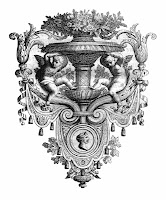ODE ON A GRECIAN URN
THOU still unravish'd bride of quietness,
Thou foster-child of Silence and slow Time,
Sylvan historian, who canst thus express
A flowery tale more sweetly than our rhyme:
What leaf-fringed legend haunts about thy shape
Of deities or mortals, or of both,
In Tempe or the dales of Arcady?
What men or gods are these? What maidens loth?
What mad pursuit? What struggle to escape?
What pipes and timbrels? What wild ecstasy?
Heard melodies are sweet, but those unheard
Are sweeter; therefore, ye soft pipes, play on;
Not to the sensual ear, but, more endear'd,
Pipe to the spirit ditties of no tone:
Fair youth, beneath the trees, thou canst not leave
Thy song, nor ever can those trees be bare;
Bold Lover, never, never canst thou kiss,
Though winning near the goal—yet, do not grieve;
She cannot fade, though thou hast not thy bliss,
For ever wilt thou love, and she be fair!
Ah, happy, happy boughs! that cannot shed
Your leaves, nor ever bid the Spring adieu;
And, happy melodist, unwearièd,
For ever piping songs for ever new;
More happy love! more happy, happy love!
For ever warm and still to be enjoy'd,
For ever panting, and for ever young;
All breathing human passion far above,
That leaves a heart high-sorrowful and cloy'd,
A burning forehead, and a parching tongue.
Who are these coming to the sacrifice?
To what green altar, O mysterious priest,
Lead'st thou that heifer lowing at the skies,
And all her silken flanks with garlands drest?
What little town by river or sea-shore,
Or mountain-built with peaceful citadel,
Is emptied of its folk, this pious morn?
And, little town, thy streets for evermore
Will silent be; and not a soul, to tell
Why thou art desolate, can e'er return.
O Attic shape! fair attitude! with brede
Of marble men and maidens overwrought,
With forest branches and the trodden weed;
Thou, silent form! dost tease us out of thought
As doth eternity: Cold Pastoral!
When old age shall this generation waste,
Thou shalt remain, in midst of other woe
Than ours, a friend to man, to whom thou say'st,
'Beauty is truth, truth beauty,—that is all
Ye know on earth, and all ye need to know.'
ODA A UNA URNA GRIEGA
Tú todavía inviolada novia del sosiego,
criatura nutrida de silencio y tiempo despacioso,
silvestre narradora que así puedes contar
una historia florida con dulzura mayor que nuestro canto.
¿Qué leyenda orlada de hojas evoca tu figura
con dioses o mortales o con ambos,
en Tempe o en los valles de Arcadia?
¿Qué hombres o qué dioses aparecen? ¿Qué rebeldes doncellas?
¿Qué loca persecución? ¿Quién lucha por huir?
¿Qué caramillos y panderos? ¿Qué éxtasis salvaje?
Dulces son las oídas melodías, pero las inoídas
son más dulces aún; sonad entonces suaves caramillos
no al oído carnal, sino, más seductores,
dejad que oiga el espíritu tonadas sin sonido.
Hermoso adolescente, bajo los árboles, no puedes
suspender tu canción ni nunca quedarán los árboles desnudos;
amante audaz, no alcanzarás el beso
tan cercano, mas no penes;
ella no puede marchitarse, aunque no se consume tu deseo,
para siempre amarás y ella será hermosa.
Ah ramas felicísimas que no podréis nunca
esparcir vuestras hojas ni abandonar jamás la primavera;
y tú, oh músico feliz, infatigable,
que modulas sin término canciones siempre nuevas;
y más feliz amor y más y más feliz amor,
entre el deseo para siempre y la inminencia de la posesión,
entre el aliento jadeante y la perpetua juventud.
Todo respira mucho más arriba que la pasión del hombre
que deja el corazón hastiado y dolorido,
y una frente febril y una boca abrasada.
¿Quiénes avanzan hacia el sacrificio?
¿Hasta qué verde altar, misterioso oficiante,
llevas esa ternera que muge hacia los cielos
y cuyos sedosos flancos se visten de guirnaldas?
¿Qué pequeña ciudad en las orillas de un río o de la mar
o en una montaña coronada de quieta ciudadela
dejan sus gentes sola en la pía mañana?
Ciudad pequeña, tus calles para siempre
quedarán en silencio y nadie nunca
para dar la razón de tu abandono ha de volver.
¡Ática forma! ¡Figura sin reproche! En mármol,
de hombres y doncellas guarnecida
y de silvestres ramos y de hierbas holladas.
Oh forma silenciosa que desafía nuestro pensamiento
como la eternidad. Oh fría pastoral.
Cuando a esta generación consuma el tiempo
tú quedarás entre otros dolores
distintos de los nuestros, tú, amiga del hombre, al que repites:
La belleza es verdad y la verdad belleza. Tal es cuanto
sobre la tierra conocéis, cuanto necesitáis conocer.
Versión castellana de JOSÉ ÁNGEL VALENTE.


